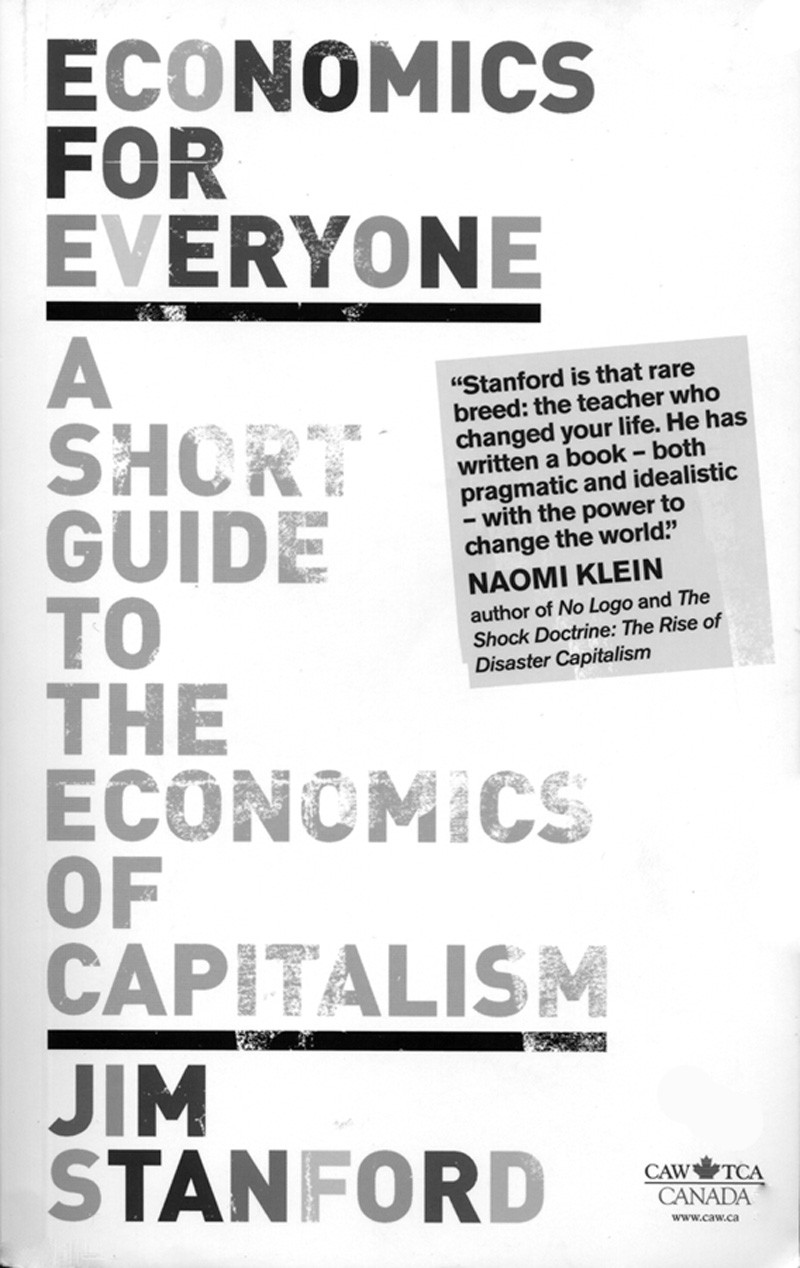
Economics for Everryone: a short guide to the economics of capitalism
Jim Stanford
Fernwood, 2008
The day after I was assigned this book review, I was talking with two friends, Derek and Corbin. Lehman Brothers had just gone bankrupt and Merrill Lynch had been bought out by Bank of America. Derek was somewhat upset by all the coverage he had seen about this. “The Dow is at its lowest in six years,” he complained. Corbin replied, “Since 2002? I don’t remember things in 2002 being all that bad.” The following week I was talking to a co-worker about this and she said, “2002 was awful.” Her husband is a financial adviser. Those conversations amount to a confirmation of one of Jim Stanford’s key points: everyone has a different stake in how capitalism works.
Stanford’s Economics for Everyone does for economics what bell hooks’ Feminism is for Everybody did for feminism. In her book, hooks makes the point that everyone has an interest in the struggle to end white supremacist capitalist patriarchal oppression. Similarly, Stanford makes the point that everyone has a stake in understanding how capitalism works and working to reform and/or overthrow it.
Stanford’s book allows readers to develop their understanding of economics through concrete examples of how capitalism affects their lives. He asks readers to begin by taking a walk through their neighbourhood and asking some basic questions. What kind of work is happening in your neighbourhood? Who is doing it? Who is benefiting from it?
Focusing the bulk of the book’s introductory section on the concept of work is an effective way of allowing people to develop a concrete understanding of capitalism by connecting it to their everyday experiences. Stanford makes it clear that the sum total of our everyday work (paid and unpaid) makes up what is called the economy. Workers, paid and unpaid, need to understand how our work fits into the capitalist economy to understand the pressures that can worsen their working conditions, as well as what leverage they have for improving their working/economic conditions.
Economics for Everyone is the cornerstone of an ambitious educational project that aims to provide working people with the opportunity to develop a nuanced understanding of capitalism. The book’s website (www.economicsforeveryone.ca) provides extra resources and lesson plans that social justice groups and community activists can adapt to their purposes, thus further democratizing the study of economics by putting the tools of analysis into readers’ hands.
Economists mystify the economy. The study of economics has become so mystified that the fact that there are other viable economic models besides capitalism isn’t even on most people’s radar. To address this deficiency of options, Stanford concludes by outlining some socialist alternatives to capitalism. He points out, importantly, that socialism will only come about through struggle, analysis, experiment, organizing, and lots and lots of hard work.
Economics for Everyone is a great example of just the kind of hard work needed to generate the class consciousness that can challenge capitalism’s grip on our economy and our imaginations.
Nick Bonokoski works for the Saskatchewan Union of Nurses, is a member of CUPE 3761, does social justice work inside the labour movement, wants to do more social justice work outside the labour movement, and is trying to finish his M.A.






